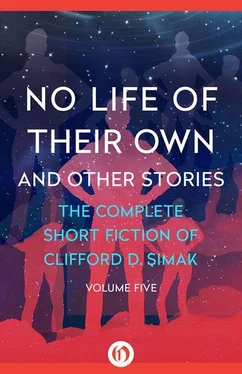Cameron pondered.
“I wonder,” he mused, “if the time force would be sufficiently like electricity to operate the radio?”
“What difference would that make?” snapped Yancey.
“Maybe we could broadcast in time,” Cameron suggested.
“But that brain generates very little power,” protested Yancey.
“We might not need much power,” Cameron told him. “It’s just a blind shot in the dark. A gamble—”
“Sounds plausible,” Yancey asserted, “let’s take a long shot.”
Cameron switched off the brain mechanism and with lengths of wire connected the radio to the mechanism. Then he switched the brain back on again. The sending set hummed with power.
“Better start gambling,” said Cabot. “Those boys out there are beginning to ray us. Playing that purple flame on the tractor.”
Cameron’s voice boomed out, speaking into the microphone.
“SOS … SOS … party of time travelers stranded in the Thames valley, near the village of Aylesford, approximately seventy thousand years before the twentieth century. Attacked by beings resembling the devils of mythology. SOS … SOS … party of time travelers stranded in the Thames valley …”
Cameron’s voice boomed on and on.
Yancey and Cabot stared out of the ports.
The devil-men were ringed around the tractor, playing the purple beams on the machine. They stood stolidly, like statues, without a trace of emotion in their features.
The tractor was beginning to heat up. The air was becoming hot and the metal was warm to the touch.
The interior of the tractor suddenly flashed with a green burst of flame.
Yancey and Cabot wheeled about.
The brain mechanism was a mass of twisted wreckage.
“Blew up,” said Cabot. “Something in the purple rays. This is the end of us now if our time-casting didn’t work. We can’t even operate the time-mechanism without the brain.”
“Look here!” cried Cabot from a port.
Cameron and Yancey rushed to his side.
Swooping down toward the tractor was a black ship, an exact duplicate of the time machine of the devil-men.
Like an avenging meteor the black craft tore downward. From its nose flashes of green fire stabbed out viciously and living lightning bolts crashed among the devil-men.
Terrified, the devil-men tried to scurry out of reach, but the lightning bolts sought them out, caught them, burned them into cinders.
“A ship out of the future!” gasped Yancey. “Our radio worked!”
CHAPTER V
The Thrill-Hunters
Andy Smith spoke earnestly. “There’s just one thing,” he said. “We can’t go back to the fifty-sixth century. Steve and I stole this time-machine. Lucky for you fellows we did, because apparently no one else caught your radio message. But if we’re caught back there it means a life stretch on Mercury for us. Our machine is the second one ever stolen. The first one is over there.”
He nodded toward the devil-men’s machine, blasted on the hillside.
“Hell,” said Yancey, “what are we blabbering around about? We have a machine that will take us through time and space. Any place we want to go. There’s plenty of room for all of us. The ship’s loaded with treasure. Do we have to decide where to go? Why can’t we just skip around and stop wherever things look good to us? Like those Centaurians. Me, I don’t care whether I ever go back to the twentieth century. I didn’t leave anybody back there.”
“Just an old maid aunt,” Cabot spoke for himself. “And she didn’t approve of me. Figured I should have settled down and made more money—added to the family fortune. Thought hunting was silly.”
The four of them looked at Cameron. He grinned.
“I’d like to find out something about what the next couple three hundred thousand years have done in the way of science,” he admitted. “Maybe could pick up a few tricks. Skim the cream of the world’s science. Probably lots of ideas we could incorporate in the time-flier.”
“Wish we knew more about that time-brain,” mourned Smith. “But I can’t understand it. The fifty-sixth hasn’t anything like it. Our machines are run on an entirely different basis. Warping of world lines principle.”
They sat in silence for a moment. From the river came the roaring bellow of a mammoth bull.
“Say,” asked Yancey, “has anyone seen anything of One-Eye?”
“No,” said Cameron. “He must have hit for high timber when all the fireworks broke out.”
“By the way,” asked Steve Clark, “What are you going to do with Pascal’s body?”
“Leave it here,” suggested Yancey. “In the tractor. If we worked a million years we couldn’t erect a more suitable burial site. Shut the door and leave him there. With his time brain. No one else will ever build another. It was all in Pascal’s head. No notes, nothing. Just his brain. He told me he meant to write a book when he got around to it. We can’t take the body back to the twentieth century and deliver it to the authorities. Because nobody would believe us. They’d throw us in the can.”
“We might take it back and leave it somewhere on his premises for someone to find,” Cabot suggested.
Yancey shook his head.
“That would be senseless. Just stir up a lot of fuss. An autopsy and an inquest and Scotland Yard half nuts over a new mystery. Pascal would rather be left here.”
“I’m inclined to agree,” said Cameron.
“That’s settled then,” said Smith, getting to his feet. “What do you say we get started? We got lots of places to go.”
Clark laughed.
“You know,” he said, sweeping a hand toward the wrecked time-flier, “I get a big kick out of the way this Centaurian business turned out. For five hundred years those long-tailed gangsters just toured all over hell, robbing everything that looked like it was worth taking. Dragging it back into prehistoric time and hiding it away. And in the end all their work was done so that five Earthmen could use it to finance a life-time of time wandering.”
Andy Smith looked thoughtful.
“But,” he said, “the Centaurians must have been robbing for some purpose. They must have had something in mind. They amassed billions of dollars in treasure. For what reason? Not just for the love of it, surely. Not just to look at. Not just for the thrill of taking it. What were they going to do with it?”
“There,” said Cameron, “is one question that will never be answered.”
Old One-Eye squatted inside the time-tractor.
It was snowing outside, but the tractor provided an excellent shelter and One-Eye was well wrapped in furs and skins. In one corner of the tractor was plenty of food.
Wrapped to his ears in a great mastodon robe, One-Eye nodded sleepily. Life was pleasant for the old Neanderthaler. Pleasant and easy. For the tribe which had wandered into the valley and found him living in the shining cave had taken him for a god. As a result they brought him food and furs, weapons and other offerings, gifts to appease his wrath, to court his favor. For who could doubt that anyone but a god would live in a cave that glinted in the sunshine, a cave made of hard, smooth stone, beautifully shaped, a cave that had no draughts and was secure against the attack of any wild beast.
One-Eye, dozing, dimly remembered the day when, curiously and idly jiggling at the door handle of the tractor, the handle moved in his hand and the door had swung smoothly open.
Henceforward the tractor had become One-Eye’s cave. In it he had lived through many summers and many snows. In it he would live out the rest of his days.
One-Eye remembered the strange friends who had come to him in this shining cave. They had gone, long ago. And One-Eye missed them. Vaguely he was lonesome for them. Many times he wished they might come back again.
Читать дальше












